In Unix-like and some other operating systems, find is a command-line utility (Find Command Examples here) can be used to search through one or more directory trees of a file system, locates files based on some user-specified criteria and applies a user-specified action on each matched file. The possible search criteria include a pattern to match against the file name or a time range to match against the modification time or access time of the file. By default, find returns a list of all files below the current working directory. 
The related locate programs use a database of indexed files obtained through find (updated at regular intervals, typically by cron job) to provide a faster method of searching the entire filesystem for files by name.
I have collected these examples and I found that I often come back to search a particular Find command to search for a specific file, so decided to put them on a post. Tech Mint seems to have the best guide and my post is based on their original post.
Find Command for Finding Files with Names
1. Find and list all files in current and sub directories
Find and list all files on your current directory.
root@kali:~# find | head . ./dir777 ./.lock ./.ICEauthority ./FindCommandExamples.txt ./.mozilla ./.mozilla/extensions ./.mozilla/firefox ./.mozilla/firefox/9n757kmh.default-1407199852988 ./.mozilla/firefox/9n757kmh.default-1407199852988/urlclassifierkey3.txt root@kali:~#
You can also use it to find a specific file, for example find all the files whose name is FindCommandExamples.txt in a current working directory.
root@kali:~# find /root -name FindCommandExamples.txt /root/FindCommandExamples.txt root@kali:~#
2. Search and list specific directory or path
Find all the files under /tmp directory. It lists out all files by default.
root@kali:~# find /tmp | head /tmp /tmp/.ICE-unix /tmp/.ICE-unix/2899 /tmp/btdADJLclI /tmp/.X0-lock /tmp/pulse-Izwfn0i4P8La /tmp/pulse-Izwfn0i4P8La/dbus-socket /tmp/pulse-Izwfn0i4P8La/native /tmp/pulse-Izwfn0i4P8La/pid /tmp/mutt-kali-0-23824-9061537041904758789 root@kali:~#
3. Find Files Using Name and Ignoring Case
Find all the files whose name is FindCommandExamples.txt and contains both capital and small letters in / directory.
root@kali:~# find / -iname findcommandexamples.txt /root/FindCommandExamples.txt root@kali:~#
4. Find Directories Using Name
Find all directories whose name is root in / directory.
root@kali:~# find / -type d -name root /opt/metasploit/apps/pro/ui/vendor/bundle/ruby/1.9.1/gems/fssm-0.2.10/spec/root /root /usr/share/nvidia-visual-profiler/plugins/org.eclipse.ui.intro.universal_3.2.500.v20110510/themes/purpleMesh/graphics/root /usr/src/linux-headers-3.14-kali1-amd64/include/config/usb/ehci/root /run/udev/links/root root@kali:~#
5. Use find to limit depth of directory search
Find command searches all files and folders all the way upto the last depth. This maybe time consuming and resource hungry when you’re searching a big directory or if you have too many small files broken into multiple directory. It is possible to to limit find command to search only upto 1 levels down (or 2 or 3 or anything you’d wish for) of subdirectories. This can be done using the maxdepth option.
root@kali:~# find /etc -maxdepth 1 -name "*.conf" | tail /etc/miredo.conf /etc/uniconf.conf /etc/pam.conf /etc/mke2fs.conf /etc/arpwatch.conf /etc/chkrootkit.conf /etc/ca-certificates.conf /etc/insserv.conf /etc/colord.conf /etc/gai.conf root@kali:~#
Now the above example show all .conf files in /etc folder.
If you want to go down 1 depth below use 2 instead of 1.
root@kali:~# find /etc -maxdepth 2 -name "*.conf" | tail /etc/arpwatch.conf /etc/chkrootkit.conf /etc/ca-certificates.conf /etc/insserv.conf /etc/colord.conf /etc/gai.conf /etc/cisco-torch/torch.conf /etc/nvidia/nvidia-blacklists-nouveau.conf /etc/nvidia/nvidia-modprobe.conf /etc/gdm3/daemon.conf root@kali:~#
The second example uses maxdepth of 2, which means it will not go lower than 2 level deep, either only in the current directory.
You can also use mindepth which works the other way around.
6. Find all PHP Files in Directory
Find all php files in a directory.
root@kali:~# find . -type f -name "*.php" ./blackmoreops.php root@kali:~#
Find Files Based on their Permissions
7. Find Files With 777 Permissions
Find all the files whose permissions are 777.
root@kali:~# find . -type f -perm 0777 -print ./0777.txt root@kali:~#
8. Find Files Without 777 Permissions
Find all the files without permission 777.
root@kali:~# find . -type f ! -perm 777 | head ./.lock ./.ICEauthority ./FindCommandExamples.txt ./.mozilla/firefox/9n757kmh.default-1407199852988/urlclassifierkey3.txt ./.mozilla/firefox/9n757kmh.default-1407199852988/cookies.sqlite ./.mozilla/firefox/9n757kmh.default-1407199852988/localstore.rdf.original ./.mozilla/firefox/9n757kmh.default-1407199852988/permissions.sqlite ./.mozilla/firefox/9n757kmh.default-1407199852988/extensions.ini ./.mozilla/firefox/9n757kmh.default-1407199852988/extensions.sqlite ./.mozilla/firefox/9n757kmh.default-1407199852988/bookmarkbackups/bookmarks-2014-08-07.json root@kali:~#
9. Find SGID Files with 644 Permissions
Find all the SGID bit files whose permissions set to 644.
root@kali:~# find . -perm 0644 | head ./.lock ./FindCommandExamples.txt ./.mozilla/firefox/9n757kmh.default-1407199852988/urlclassifierkey3.txt ./.mozilla/firefox/9n757kmh.default-1407199852988/cookies.sqlite ./.mozilla/firefox/9n757kmh.default-1407199852988/localstore.rdf.original ./.mozilla/firefox/9n757kmh.default-1407199852988/permissions.sqlite ./.mozilla/firefox/9n757kmh.default-1407199852988/extensions.ini ./.mozilla/firefox/9n757kmh.default-1407199852988/extensions.sqlite ./.mozilla/firefox/9n757kmh.default-1407199852988/places.sqlite-wal ./.mozilla/firefox/9n757kmh.default-1407199852988/indexedDB/chrome/idb/2588645841ssegtnti.sqlite root@kali:~#
10. Find Sticky Bit Files with 551 Permissions
Find all the Sticky Bit set files whose permission are 551.
root@kali:~# find / -perm 0551
11. Find SUID Files
Find all SUID set files.
root@kali:/bin# find . -perm /u=s | head ./mount ./su ./ping ./umount ./ping6 ./fusermount root@kali:/bin#
12. Find SGID Files
Find all SGID set files.
root@kali:/var# find . -perm /g+s | head ./lib/tor ./lib/libuuid ./cache/man ./cache/man/ja ./cache/man/ja/cat5 ./cache/man/ja/cat8 ./cache/man/ja/cat1 ./cache/man/cat5 ./cache/man/pa ./cache/man/pa/cat5 root@kali:/var#
13. Find Read Only Files
Find all Read Only files.
root@kali:~# find / -perm /u=r | head / /etc /etc/logcheck /etc/logcheck/ignore.d.workstation /etc/logcheck/ignore.d.workstation/mysql-server-5_5 /etc/logcheck/ignore.d.workstation/lirc /etc/logcheck/ignore.d.server /etc/logcheck/ignore.d.server/mysql-server-5_5 /etc/logcheck/ignore.d.server/iodined /etc/logcheck/ignore.d.server/lirc
14. Find Executable Files
Find all Executable files.
root@kali:/bin# find . -perm /a=x | head . ./tailf ./ntfswipe ./dir ./dd ./true ./mountpoint ./ypdomainname ./zmore ./stty root@kali:/bin#
15. Find Files with 777 permissions and change permissions to 644
Find all 777 permission files and use chmod command to set permissions to 644.
root@kali:~# find / -type f -perm 0777 -print -exec chmod 644 {} \;
/root/blackmoreops.php
root@kali:~#
16. Find Directories with 777 permissions and permissions to 755
Find all 777 permission directories and use chmod command to set permissions to 755.
root@kali:~# find . -type d -perm 777 -print -exec chmod 755 {} \;
./dir777
root@kali:~#
17. Find and remove single File
To find a single file called FindCommandExamples.txt and remove it.
root@kali:~# find . -type f -name "FindCommandExamples.txt" -exec rm -f {} \;
18. Find and remove Multiple File
To find and remove multiple files such as .mp3 or .txt, then use.
root@kali:~# find . -type f -name "*.txt" -exec rm -f {} \;
OR
root@kali:~# find . -type f -name "*.mp3" -exec rm -f {} \;
19. Find all Empty Files and directories
To file all empty files under certain path.
root@kali:~# find /tmp -type f -empty /tmp/mutt-kali-0-23824-9061537041904758789 /tmp/mutt-kali-0-23410-1906773975188079418 /tmp/qtsingleapp-flareg-bcdb-0-lockfile root@kali:~#
To file all empty directories under certain path.
root@kali:~# find /tmp -type d -empty /tmp/pulse-PKdhtXMmr18n /tmp/tracker-root /tmp/orbit-root /tmp/plugtmp root@kali:~#
20. File all Hidden Files
To find all hidden files, use below command.
root@kali:~# find /tmp -type f -name ".*" /tmp/.X0-lock root@kali:~#
Search Files Based On Owners and Groups
21. Find Single File Based on User
To find all or single file called FindCommandExamples.txt under / root directory of owner root.
root@kali:~# find / -user root -name FindCommandExamples.txt /root/FindCommandExamples.txt root@kali:~#
22. Find all Files Based on User
To find all files that belongs to user root under / directory.
root@kali:~# find / -user root | head / /etc /etc/logcheck /etc/logcheck/ignore.d.workstation /etc/logcheck/ignore.d.workstation/mysql-server-5_5 /etc/logcheck/ignore.d.workstation/lirc /etc/logcheck/ignore.d.server /etc/logcheck/ignore.d.server/mysql-server-5_5 /etc/logcheck/ignore.d.server/iodined /etc/logcheck/ignore.d.server/lirc root@kali:~#
23. Find all Files Based on Group
To find all files that belongs to group root under / directory.
root@kali:~# find / -group root | head / /etc /etc/logcheck /etc/logcheck/ignore.d.workstation /etc/logcheck/ignore.d.workstation/mysql-server-5_5 /etc/logcheck/ignore.d.workstation/lirc /etc/logcheck/ignore.d.server /etc/logcheck/ignore.d.server/mysql-server-5_5 /etc/logcheck/ignore.d.server/iodined /etc/logcheck/ignore.d.server/lirc root@kali:~#
24. Find Particular Files of User
To find all .txt files of user root under / directory.
root@kali:~# find / -user root -iname "*.txt" | head /etc/X11/rgb.txt /etc/bluemaho/handbook.txt /etc/unicornscan/ports.txt /etc/unicornscan/oui.txt /etc/siege/urls.txt /boot/extlinux/boot.txt /var/lib/inetsim/data/tftp/tftproot/sample.txt /var/lib/inetsim/data/quotd/quotd.txt /var/lib/inetsim/data/ftp/ftproot/sample.txt /var/lib/inetsim/data/http/fakefiles/sample.txt root@kali:~#
Find Files and Directories Based on Date and Time
25. Find Last 50 Days Modified or Accessed Files
To find all the files which are modified 50 days back.
root@kali:~# find / -mtime 50 /opt/metasploit/apps/pro/ui/scripts/ctl.rb /opt/metasploit/apps/pro/ui/scripts/worker_ctl.rb
To find all the files which are accessed 50 days back.
root@kali:~# find / -atime 50
26. Find Last 50-100 Days Modified Files
To find all the files which are modified more than 50 days back and less than 100 days.
root@kali:~# find / -mtime +50 -mtime -100 | head /etc/chatscripts/provider /etc/profile /etc/ssh/sshd_config /etc/host.conf /etc/console-setup/Uni2-Fixed16.psf.gz /etc/default/ntfs-3g /etc/default/saned /etc/default/atftpd /etc/default/exim4 /etc/network/if-up.d/wpasupplicant root@kali:~#
27. Find Changed Files in Last 1 Hour
To find all the files which are changed in last 1 hour.
root@kali:~# find / -cmin -60 | head /proc/asound /proc/asound/NVidia /proc/asound/MID /proc/asound/card1 /proc/asound/card1/id /proc/asound/card1/codec#0 /proc/asound/card1/codec#1 /proc/asound/card1/codec#2 /proc/asound/card1/codec#3 /proc/asound/card1/eld#0.0 root@kali:~#
28. Find Modified or Accessed Files in Last 1 Hour
To find all the files which are modified in last 1 hour.
root@kali:~# find / -mmin -60
To find all the files which are accessed in last 1 hour.
root@kali:~# find / -amin -60
Find Files and Directories Based on Size
29. Find 15MB Files
To find all 15MB files, use.
root@kali:~# find / -size 15M /var/lib/dkms/nvidia-current/331.67/3.14-kali1-amd64/x86_64/module/nvidia-current.ko /opt/jdk1.7.0_60/lib/tools.jar /opt/jdk1.7.0_60/jre/lib/amd64/server/libjvm.so /opt/jdk1.7.0_60/jre/lib/jfxrt.jar /root/Work/conky-manager/default-themes-extra-1.cmtp.7z /usr/lib/python2.7/config/libpython2.7-pic.a /usr/lib/python2.7/config/libpython2.7.a /usr/lib/jvm/java-7-openjdk-amd64/jre/lib/amd64/server/libjvm.so /usr/bin/multiforcer /usr/bin/mono-sgen /usr/share/zaproxy/lib/jfxrt.jar root@kali:~#
30. Find Size between 50MB – 100MB
To find all the files which are greater than 50MB and less than 100MB.
root@kali:~# find / -size +50M -size -100M /var/cache/apt/archives/nvidia-visual-profiler_5.0.35-8~bpo70+1_amd64.deb /var/cache/apt/archives/nvidia-cuda-doc_5.0.35-8~bpo70+1_all.deb /var/cache/apt/archives/metasploit-framework_4.9.3-2014072301-1kali0_amd64.deb /opt/jdk1.7.0_60/jre/lib/rt.jar /opt/Teeth/units/CVE-2013-07-11.csv /root/Downloads/cudaHashcat-1.21.7z /usr/lib/chromium/chromium /usr/lib/x86_64-linux-gnu/libcublas.so.5.0.35 /usr/lib/x86_64-linux-gnu/libwireshark.so.3.1.1 /usr/lib/x86_64-linux-gnu/libnpp.so.5.0.35 /usr/share/w3af/w3af/plugins/crawl/phishtank/index.xml /usr/share/wordlists/rockyou.txt.gz /run/shm/pulse-shm-1617702718 /run/shm/pulse-shm-543938446 /run/shm/pulse-shm-2061196650 /run/shm/pulse-shm-519747678 /run/shm/pulse-shm-5957035 /run/shm/pulse-shm-2279876097 root@kali:~#
31. Find and Delete 100MB Files
To find all 100MB files and delete them using one single command.
root@kali:~# find / -size +100M -exec rm -rf {} \;
32. Find Specific Files and Delete
Find all .mp3 files with more than 10MB and delete them using one single command.
root@kali:~# find / -type f -name *.mp3 -size +10M -exec rm {} \;
Conclusion:
This was a small guide on how to use Linux Find Command. I gathered these info as much I could and found them useful. Hope this benefits you too.
Sources:
- Wikipedia: http://en.wikipedia.org/wiki/Find
- TechMing: http://www.tecmint.com/35-practical-examples-of-linux-find-command/
 blackMORE Ops Learn one trick a day ….
blackMORE Ops Learn one trick a day ….
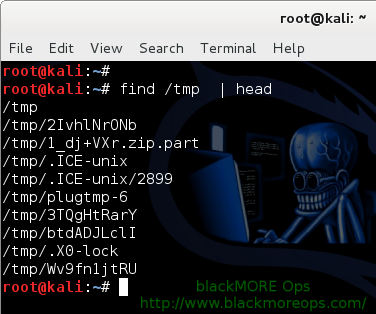

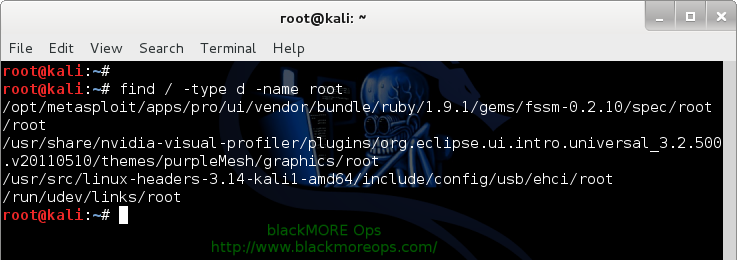
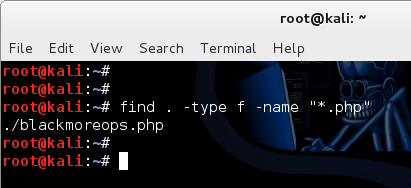
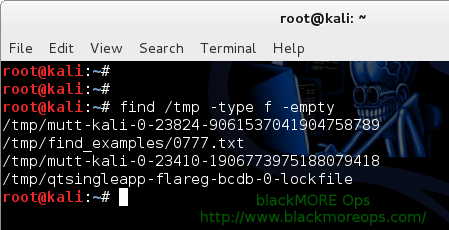
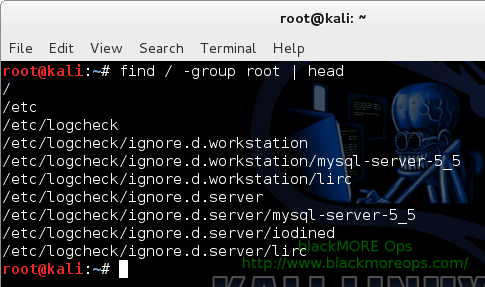
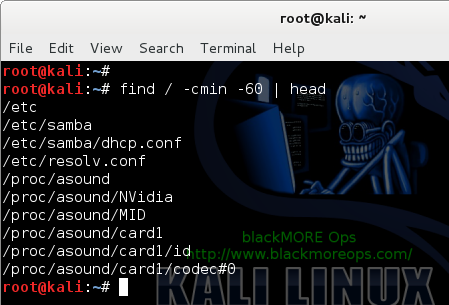
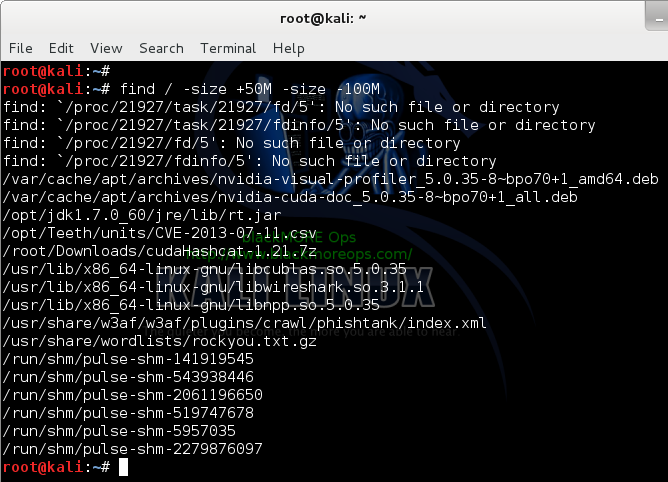
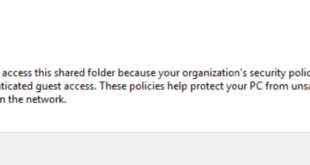
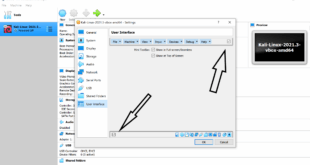
I’d like to find out more? I’d love to find out
some additional information.
nice blog sr